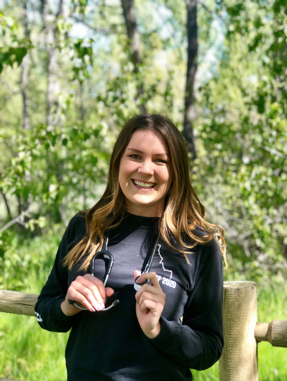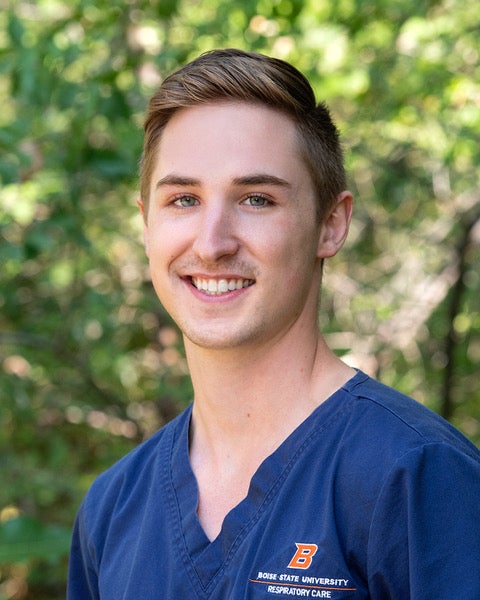
In times of crisis, many are called to the front lines; others race to get there. In the midst of the COVID-19 pandemic, two Boise State respiratory care students overloaded their academic schedules in an effort to graduate early and enter the workforce to aid clinical partners in the Treasure Valley.
Students Mike Purta and Kelly Reilly each took 22 credits in order to graduate in May instead of their anticipated August graduation date.
“Kelly and Mike are excellent students,” said Lonny Ashworth, a professor and director of research in the Department of Respiratory Care. “Honestly, I expect each of them to become leaders in our field in the near future.”
Respiratory therapists work in medical settings – from trauma wards and intensive care units to burn wards and more – to manage patients with respiratory illness, including patients suffering from COVID-19 complications. The current pandemic has exposed a critical shortage of respiratory therapists trained to operate life-saving ventilators.
“Respiratory therapy is a very technical specialty, as we have modern mechanical ventilators and other respiratory support devices that are growing in complexity and capability,” explained Joe Coyle, interim chair of the Department of Respiratory Care. “That said, the patient-device interface is where the ‘art’ of respiratory care resides. They have to have the technical expertise, and the interpersonal skills to reassure and get the patient’s confidence. It takes a strong ability to assess a situation efficiently, critically analyze a set of data, apply the right solution, and monitor response to the intervention.”
Boise State offers three respiratory care programs – a four-year bachelor’s degree for students new to the field, an online degree track for those with an associate’s degree in respiratory therapy to complete their Bachelor of Science Degree in Respiratory Care, and a Master of Science in Respiratory Care for those who want to advance their careers with a focus on educational leadership. The department has been responding quickly to the needs of the local healthcare community in addressing the pandemic.
“We are often the first ones to be called when a patient stops breathing and we are a part of the medical response team, and the code team,” Reilly said. “We are the experts on ventilator management and any other oxygen or flow-related devices and therapies, and are a huge part of patient advocacy.”
Two medical mission trips as a teenager – one to Vietnam, the other to Kenya – inspired Reilly to work in healthcare. Reilly even took years of after-school courses to get her medical assistant certification, which allowed her to work in a doctor’s office while still in high school.
She assumed nursing was her future. It wasn’t until the 22-year-old San Clemente, California, native stepped foot on Boise State’s campus that an advisor introduced her to respiratory care and something clicked.
“To this day I am so very grateful I discovered this field,” she said. Concurrent to her studies at Boise State, Reilly worked at Saint Alphonsus Regional Medical Center as a respiratory therapist technician. Her role was to clean, package, take inventories and maintain all respiratory care equipment – a job that has become more vital as the pandemic has worsened.
“I also serve as a floor care therapist when needed under my student license,” she said. “I feel lucky that I chose this profession as my help is needed more than ever in these times to come.”
“For students who are dedicated to helping people, who want to become experts in an area of healthcare, who want to be at the patient’s bedside at all times, and want to have a blend of patient care and utilizing state-of-the-art medical equipment, respiratory care is a wonderful, rewarding profession,” Ashworth said.

Like Reilly, 23-year-old Purta was interested in becoming a nurse until a chance encounter job shadowing respiratory therapists changed his mind.
“I got to watch them work with their ventilator patients in the intensive care unit and see them receive critical patients from the ER,” he said. “Within one hour, I knew that this was the profession for me! I rescinded my nursing application and applied to Boise State’s respiratory program that same day.”
Purta also worked at Saint Alphonsus Regional Medical Center as a respiratory therapist technician, helping with basic patient care as well as assembling and calibrating respiratory equipment.
“It has been a very valuable learning opportunity,” the Coeur d’Alene native said. “The amount of collaboration, innovation and leadership I have seen come out of our community during this pandemic is remarkable. It has reinforced to me that I really did pick the right career and work with some phenomenal health care professionals.”
Like all Boise State students, Purta and Reilly had a difficult adjustment period when the university switched to remote learning in March to prevent the spread of COVID-19. Much-needed student clinics were canceled. Valuable, in-person training was lost. Despite the setbacks, both students pushed to add more credit hours to their schedules in an effort to graduate early and take on larger roles at work.
The students finished the semester by taking courses on patient communication and COVID-19 research, among others. Both students note that their early graduation couldn’t have happened without the support and help of respiratory care faculty.
“I am also outstandingly grateful for my professor Lonny Ashworth and Dr. Coyle,” Reilly said. “They created a class for me and my classmate/coworker so we are able to get supplemental learning on COVID 19 respiratory management and graduate in May instead of August. This will allow both of us to enter the workforce months earlier in these tough times where help is needed.”
“I am so thankful to have instructors and faculty who advocate for us as students to train with the latest and greatest in technology,” Purta added. “We have always been provided the very best ventilators, equipment and resources to succeed in both our program and in providing the very best care to the patients in our community.”
Both students will become registered respiratory therapists at Saint Alphonsus this summer.
“This is a trauma hospital, and I plan to work on expanding my respiratory skills in trauma once I have more privileges as a Registered Respiratory Therapist,” Reilly said.
As for Purta, he is already planning his return to Boise State – as a faculty member.
“Over the last two years, I have really discovered my passion for teaching others,” he said. “I plan on going back to Boise State to pursue teaching respiratory care after I have enough clinical experience.”
“[Kelly and Mike] are great representatives of the Bronco community, and they have put in a lot of hard work, not only to learn this high-tech field, but to make the transition from civilian to health care provider,” Coyle said. “As an older clinician, it gives me great hope to see the quality and integrity of the next generation stepping up to care for our patients.”